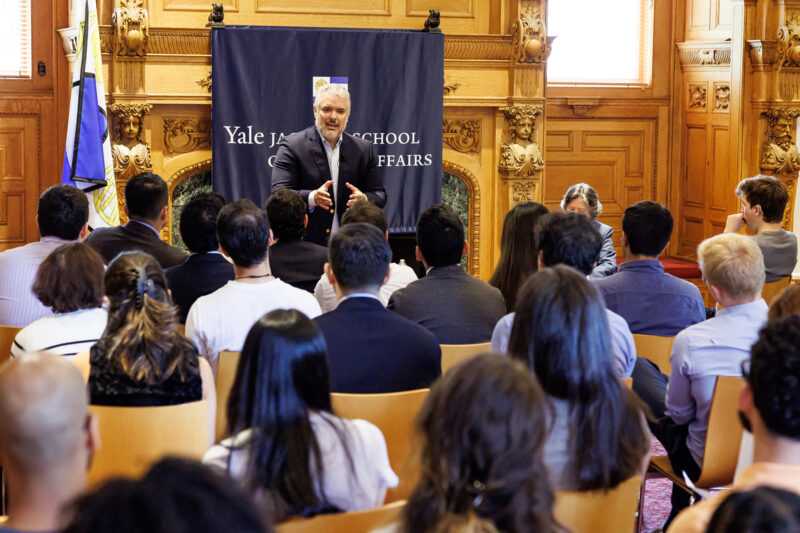Iván Duque, the former president of Colombia, visited the Jackson School of Global Affairs on September 13 for a discussion about his presidential term, from his rise to the country’s highest office in 2018 to the many challenges he faced during his four-year term.
The son of a political scientist and a politician, Duque called it “destiny” when asked about his passion for politics by Jessica Faieta, a Senior Fellow at Jackson who moderated the conversation. After more than a decade in the private sector — most of which was spent representing Colombia at the Inter-American Development Bank (IDB) — he was elected to the Colombian Senate in 2014 and, in 2018, was elected president of Colombia at just 41 years old.
Duque’s presidency was marked by numerous challenges, most notably the COVID-19 pandemic — a challenge he was surprisingly prepared for. While with IDB, Duque dealt with the H1N1 and SARS outbreaks of the 2000s, an experience that prompted him to read numerous books on pandemics. When the COVID-19 pandemic began and the first cases appeared in Colombia, Duque says he acted quickly to shut down the country, a decision he called “one of the most difficult of my life.”
“How do you balance public health and the economy?” Duque said of the decision. “A large country like the U.S. can handle that but it’s more difficult in a developing nation like Colombia.” His administration worked swiftly to acquire sufficient medical equipment and vaccines for those infected and kept in constant contact with the Colombian through televised addresses, he explained.
A public health matter exacerbated another challenge during Duque’s presidency: refugees entering Colombia from neighboring Venezuela. With more than a million Venezuelans already estimated to have fled their country’s dictatorship for Colombia, thousands more arrived in 2019 looking for vaccines after a chickenpox outbreak.
Duque said he spoke out against the Venezuelan government and in 2021, against the urging of his advisors, granted temporary protected legal status to Venezuelan migrants for 10 years.
“When you enter politics, you are going to be challenged,” Duque told the gathered students. “Don’t lose your idealism or your values, even when you have to make difficult public policy decisions.”
The discussion with Duque was co-sponsored by the Yale International Leadership Center (ILC), the Yale MacMillan Center’s Council on Latin American and Iberian Studies (CLAIS), and the Jackson Latin America and the Caribbean student organization.
